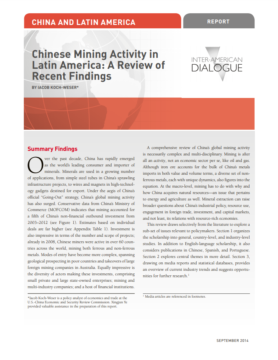The Politics Of Disaster Relief
After a 7.0 magnitude earthquake struck Haiti, the aftershock reached China in ways that few anticipated.The earthquake forced Chinese leaders to navigate the tricky politics of disaster relief.
This post is also available in: Español
In order to cope with the complex demands of its growing global role, China has been keeping a closer eye on international affairs. Nowhere is this clearer than in China’s recent push to foster area studies development within nation’s top educational institutions. The Inter-American Dialogue’s recent report, Learning Latin America: China’s Strategy for Area Studies Development, traces the gradual development of China’s area studies, with an in-depth look at Chinese study of the Latin America and Caribbean (LAC) region.
China’s efforts to develop foreign expertise are supported by a robust policy framework. Launched by the Ministry of Education in 2011, China’s “Regional and Country Studies Bases” policy calls for a nation-wide network of area studies centers to carry out basic and applied research on foreign regions and subregions, from the Persian Gulf to the Amazon and beyond. This includes a two-step registration and accreditation process, as outlined by the Ministry of Education, with related incentives, including the possibility of $45,000-$75,260 in center funding.
The requirements for center registration are relatively straightforward. For example, centers must provide evidence of a clear organizational structure, designate office space, and establish an “academic research institution,” such as a Confucius Institute, in the center’s geographic area of focus. To achieve full accreditation, area studies centers must hold at least one course on the center’s area of specialty and one annual scholarly meeting, among other requirements.
[...]
After a 7.0 magnitude earthquake struck Haiti, the aftershock reached China in ways that few anticipated.The earthquake forced Chinese leaders to navigate the tricky politics of disaster relief.
Despite reports in recent months that Mexican manufacturing is experiencing a resurgence, Mexico’s industrial sector faces tremendous challenges.
China has rapidly emerged as the world’s leading consumer and importer of minerals.
 Slava Bowman / Unsplash
Slava Bowman / Unsplash
